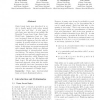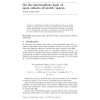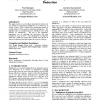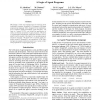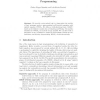124
Voted
EUSFLAT
2007
15 years 4 months ago
2007
Fuzzy formal logics were introduced in order to handle graded truth values instead of only ‘true’ and ‘false’. A wide range of such logics were introduced successfully, li...
117
Voted
AIML
2008
15 years 4 months ago
2008
In this paper we study the intermediate logic MLO(X) of open subsets of a metric space X. This logic is closely related to Medvedev's logic of finite problems ML. We prove sev...
97
Voted
DEON
2008
Springer
15 years 4 months ago
2008
Springer
Abstract. This paper considers the problem of checking whether an organization conforms to a body of regulation. Conformance is cast as a trace checking question
115
Voted
DAC
2005
ACM
15 years 4 months ago
2005
ACM
This paper presents a novel synthesis algorithm that reduces the area needed for implementing multiplexers on an FPGA by an average of 18%. This is achieved by reducing the number...
101
Voted
ICALP
2010
Springer
15 years 4 months ago
2010
Springer
Abstract. The HalpernShoham logic is a modal logic of time intervals. Some eort has been put in last ten years to classify fragments of this beautiful logic with respect to decid...
125
Voted
ATAL
2008
Springer
15 years 4 months ago
2008
Springer
Two currently active strands of research on logics for multi-agent systems are dynamic epistemic logic, focusing on the epistemic consequences of actions, and logics of coalitiona...
146
Voted
FLAIRS
2008
15 years 5 months ago
2008
Combining probability and first-order logic has been the subject of intensive research during the last ten years. The most well-known formalisms combining probability and some sub...
113
click to vote
AAAI
2007
15 years 5 months ago
2007
We present a sound and complete logic for reasoning about SimpleAPL programs. SimpleAPL is a fragment of the agent programming language 3APL designed for the implementation of cog...
150
Voted
TYPES
1995
Springer
15 years 6 months ago
1995
Springer
Natural Deduction style presentations of program logics are useful in view of the implementation of such logics in interactive proof development environments, based on type theory,...
96
Voted
EPIA
1995
Springer
15 years 6 months ago
1995
Springer
We provide a nine-valued logic to characterize the models of logic programs under a paraconsistent well-founded semantics with explicit negation WFSX p. We define a truth-function...
